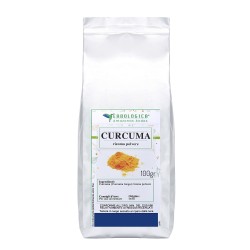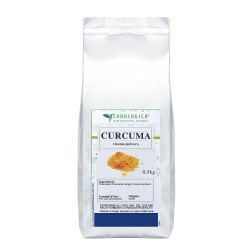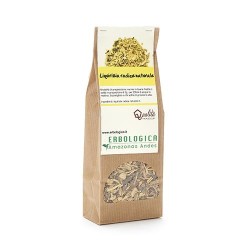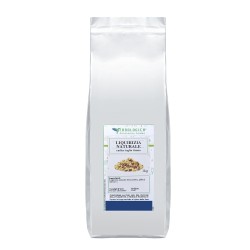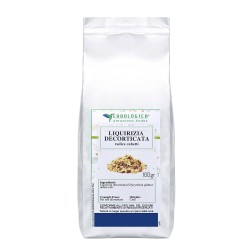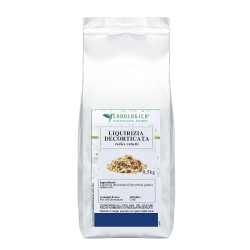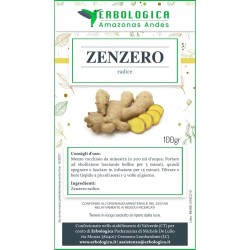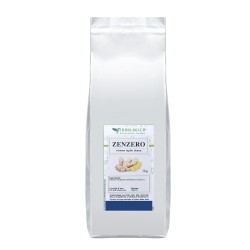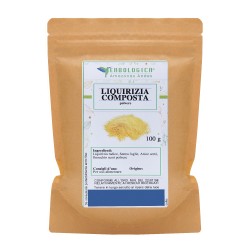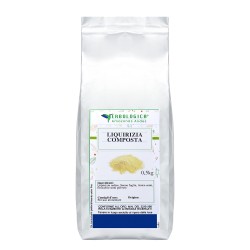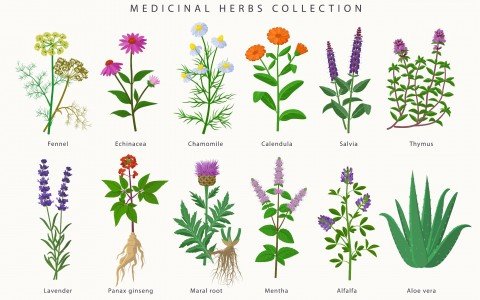
I rimedi erboristici sono stati utilizzati per secoli come metodo sicuro ed efficace per trattare molti disturbi, compresi quelli dell'apparato respiratorio.
I farmaci a base di erbe hanno il potere di migliorare la salute dei polmoni, rafforzare il sistema immunitario e ridurre le infiammazioni.
Sono anche noti per contribuire ad alleviare i sintomi di asma, bronchite e altre malattie respiratorie.
I rimedi erboristici rappresentano un approccio naturale e olistico al trattamento delle malattie respiratorie e i loro potenziali benefici sono sempre più riconosciuti.
Con un'ampia varietà di erbe medicinali disponibili, le persone possono trovare il rimedio perfetto per le loro esigenze specifiche.
Che si tratti di un tè a base di zenzero e curcuma per aiutare a eliminare la congestione o di un inalatore a base di eucalipto e menta per ridurre l'infiammazione, il potere delle erbe medicinali è innegabile.
Con la giusta combinazione di rimedi erboristici, è possibile migliorare significativamente la salute delle vie respiratorie e ridurre i sintomi di molte malattie respiratorie.
Introduzione ai rimedi erboristici e ai loro potenziali benefici
I rimedi erboristici sono derivati dalle piante e sono stati utilizzati per secoli per trattare diverse condizioni di salute.
I loro principi attivi hanno potenti proprietà medicinali che possono essere utilizzate per trattare molte malattie, comprese quelle del sistema respiratorio.
I rimedi erboristici sono noti per essere sicuri e privi di effetti collaterali e possono essere utilizzati come approccio naturale e olistico al trattamento delle malattie respiratorie.
I potenziali benefici dei rimedi erboristici sono vasti e vari.
I rimedi erboristici possono contribuire a ridurre l'infiammazione dell'apparato respiratorio, a migliorare la capacità e la forza dei polmoni e a rafforzare il sistema immunitario.
I rimedi a base di erbe possono essere utilizzati sotto forma di tè, infusi e inalatori, o anche assunti per via orale sotto forma di pillole e capsule.
I diversi tipi di erbe medicinali e i loro usi
Esistono diversi tipi di erbe medicinali che possono essere utilizzate per trattare i disturbi respiratori.
Alcune delle erbe più comunemente utilizzate sono:
Curcuma: La curcuma ha potenti proprietà antinfiammatorie che possono contribuire a ridurre l'infiammazione dei polmoni.
Può anche contribuire a rafforzare il sistema immunitario e a ridurre i sintomi dell'asma e di altre malattie respiratorie.
Zenzero: Lo zenzero è noto per la sua capacità di aiutare a eliminare la congestione e a ridurre la produzione di muco.
Può essere utilizzato anche per ridurre l'infiammazione dei polmoni e della gola.
Eucalipto: L'eucalipto ha potenti proprietà antinfiammatorie e può essere utilizzato per ridurre l'infiammazione del sistema respiratorio.
Può essere utilizzato anche sotto forma di inalante per ridurre la congestione e migliorare la respirazione.
Menta piperita: La menta piperita viene utilizzata da secoli per alleviare i sintomi di asma, bronchite e altre malattie respiratorie.
Può anche essere usata per ridurre l'infiammazione dei polmoni e della gola.
Camomilla: La camomilla è nota per le sue proprietà calmanti e lenitive e può essere utilizzata per ridurre l'infiammazione dei polmoni e della gola.
Può essere utilizzata anche per alleviare i sintomi di asma, bronchite e altre malattie respiratorie.
Come scegliere i rimedi erboristici più adatti alle proprie esigenze
Quando si scelgono i rimedi erboristici per la salute delle vie respiratorie, è importante considerare le proprie esigenze specifiche e trovare il rimedio più adatto.
Le diverse erbe hanno proprietà diverse e possono essere utilizzate in modi diversi, quindi è importante fare una ricerca e assicurarsi di utilizzare le erbe giuste per le proprie esigenze.
È anche importante assicurarsi di utilizzare erbe di qualità.
Ci sono molti tipi diversi di rimedi a base di erbe disponibili sul mercato ed è importante assicurarsi di acquistare da una fonte affidabile.
Prima di utilizzare i rimedi erboristici, è bene parlarne con il proprio medico, poiché potrebbero interagire con alcuni farmaci.
Come preparare tisane, infusi e inalanti
Rimedi erboristici possono essere utilizzati sotto forma di tisane, infusi e inalanti.
Le tisane si preparano mettendo in infusione le erbe in acqua bollente, mentre gli infusi si ottengono immergendo le erbe in acqua fredda per un certo periodo di tempo.
Gli inalanti si ottengono mettendo in infusione le erbe in acqua bollente e inalando il vapore.
Quando si preparano i rimedi a base di erbe, è importante seguire attentamente le istruzioni.
Le erbe hanno proprietà diverse e devono essere preparate in modi diversi.
Per esempio, lo zenzero va messo in infusione in acqua bollente per 5-10 minuti, mentre l'eucalipto va messo in infusione per 15-20 minuti.
È inoltre importante ricordare che i rimedi erboristici possono richiedere del tempo per fare effetto.
Potrebbero essere necessarie diverse settimane o addirittura mesi per vedere gli effetti completi, quindi è importante essere pazienti e coerenti con il trattamento.
Rimedi erboristici per migliorare la capacità polmonare e l'immunità
Rimedi erboristici possono essere utilizzati anche per migliorare la capacità polmonare e rafforzare il sistema immunitario.
Ecco alcune delle erbe più comuni utilizzate a questo scopo:
Ginseng: il ginseng è noto per la sua capacità di contribuire a migliorare la capacità polmonare e a rafforzare il sistema immunitario.
Può anche contribuire a ridurre l'infiammazione dei polmoni e della gola e a ridurre i sintomi dell'asma e di altre malattie respiratorie.
Radice di liquirizia: La radice di liquirizia ha potenti proprietà antinfiammatorie e può essere utilizzata per ridurre l'infiammazione del sistema respiratorio.
Può anche contribuire a rafforzare il sistema immunitario e a migliorare la capacità polmonare.
Astragalo: l'astragalo è noto per la sua capacità di contribuire a rafforzare il sistema immunitario e a migliorare la capacità polmonare.
Può anche contribuire a ridurre l'infiammazione dei polmoni e della gola e a ridurre i sintomi dell'asma e di altre malattie respiratorie.
Verbasco: Il verbasco è noto per la sua capacità di contribuire a ridurre l'infiammazione dei polmoni e della gola.
Fungo Reishi: Il fungo Reishi è noto per la sua capacità di contribuire a rafforzare il sistema immunitario e a migliorare la capacità polmonare.
Come trovare rimedi erboristici di qualità
Quando si cercano rimedi erboristici di qualità, è importante assicurarsi di acquistare da una fonte affidabile.
Inoltre, prima di utilizzare qualsiasi rimedio a base di erbe, è bene parlarne con il proprio medico, poiché potrebbero interagire con alcuni farmaci.
È anche importante assicurarsi di utilizzare le erbe giuste per le proprie esigenze.
Erbe diverse hanno proprietà diverse, quindi è importante fare ricerche e assicurarsi di usare le erbe giuste per le proprie esigenze specifiche.
Conclusioni
Erbe officinalii offrono numerosi potenziali benefici per la salute delle vie respiratorie.
Possono contribuire a ridurre l'infiammazione dei polmoni e della gola, a migliorare la capacità e la forza dei polmoni e a rafforzare il sistema immunitario.
Possono inoltre contribuire a ridurre i sintomi di asma, bronchite e altre malattie respiratorie.
I rimedi erboristici rappresentano un approccio naturale e olistico al trattamento delle malattie respiratorie e offrono un'ampia gamma di potenziali benefici.
Con la giusta combinazione di erbe, è possibile migliorare significativamente la salute delle vie respiratorie e ridurre i sintomi di molte malattie respiratorie.


